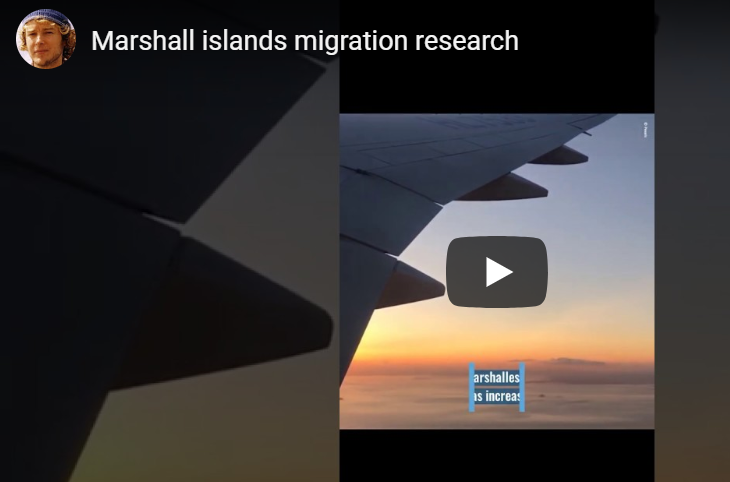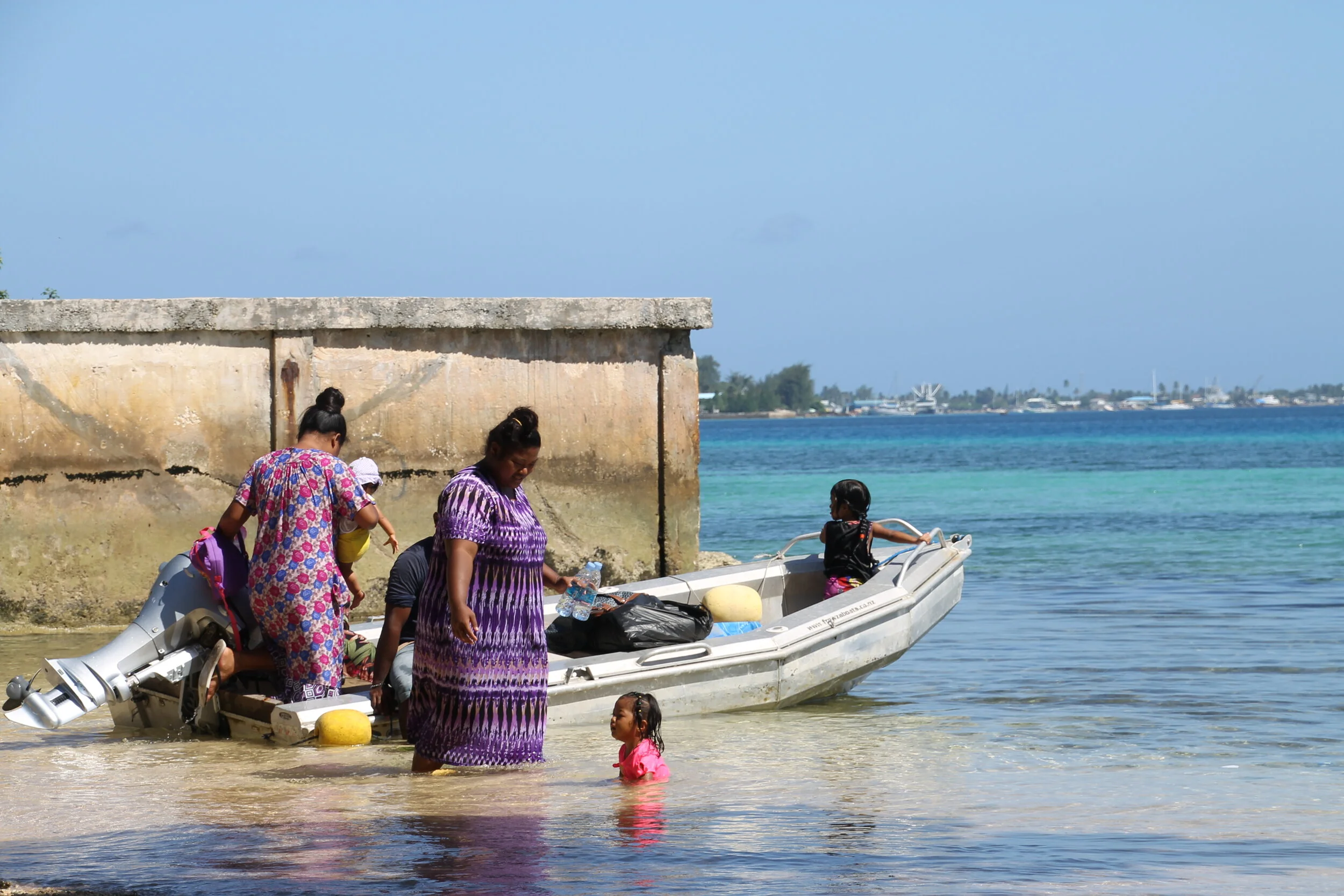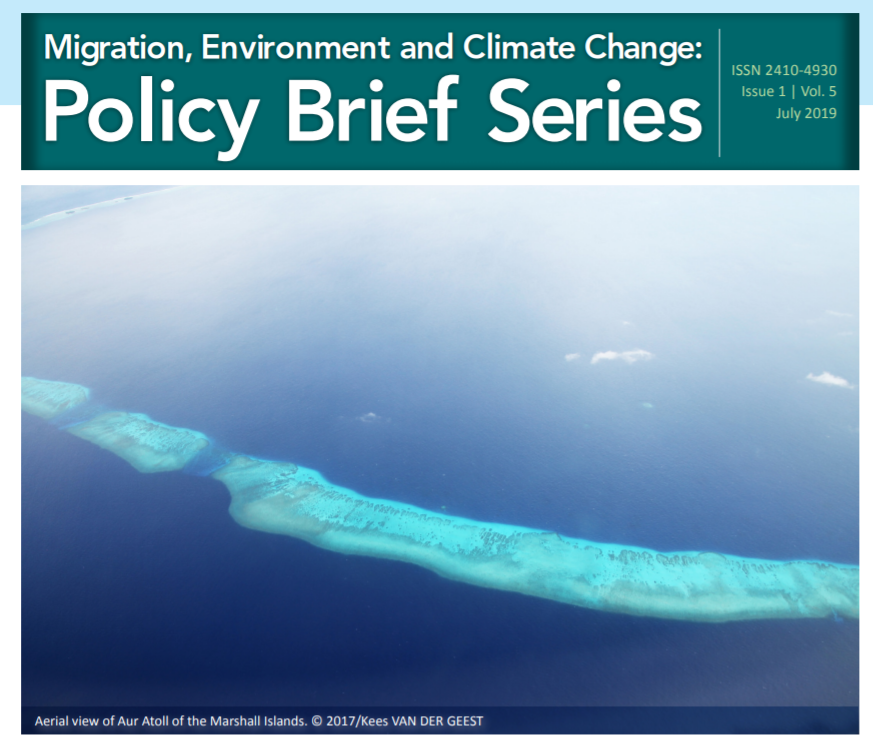Visual summary of research findings on climate change and migration in the Marshall Islands. Video by Arianna Flores-Corral of the UNU-EHS Communication Unit
Por Brittany Lauren Wheeler en nombre del Proyecto “Clima y Migración en las Islas Marshall”
Un lugar de continuidad y cambio
La República de las Islas Marshall (RIM) cuenta con una larga y singular historia de migración y desplazamiento que se entrelaza con una situación ambiental compleja y vulnerable. La cadena de 29 atolones de coral, que se encuentra a menos de 2 m. sobre el nivel del mar en su punto más alto, hace que este estado-nación de escasa elevación sea extremadamente vulnerable al estrés térmico, la sequía, las tormentas, el aumento del nivel del mar y los impactos asociados con los suministros de agua dulce y con la tierra habitable. La navegación oceánica, la reubicación inducida por las pruebas nucleares de Estados Unidos y el aumento reciente de la migración hacia este país, habilitada por el Pacto de Libre Asociación (COFA, por sus siglas en inglés), han creado un contexto especial para la investigación sobre la migración contemporánea inducida por el clima….
The Marshall Islands is a nation of widely dispersed, low-lying coral atolls and islands, and with climate change causing sea levels to rise and shifting weather patterns, the Marshall Islands is faced with flooding, heat stress and drought. The Marshall Islands Climate and Migration Project studies the multicausal nature of Marshallese migration, as well as its impact on migrants themselves and communities in the Marshall Islands. This policy brief highlights key findings on migration patterns, drivers and impacts, and discusses the tension between being prepared to move and fortifying to stay in place.
By Giff Johnson (RMZ New Zealand)
Most Marshall Islanders living in their home islands say that job opportunities, education, medical needs or family visits are the reasons that they leave to the United States.
But a new survey of Marshallese living in the Marshall Islands and in the United States to identify the "drivers" of out-migration suggests climate change factors are in the mix of reasons why people are departing the Marshall Islands…
"A threat looms on the sun-splashed horizon of the Republic of the Marshall Islands. The specter of climate change wraps its fingers around the islands, raising sea levels, salinizing soils, and sapping freshwater resources". Author, Mickael De Souza was a research intern with the William S. Richardson School of Law at the University of Hawaiʻi. Thank you to the NGOs that contributed their time and energy to the study, including Legal Aid Society of Hawaiʻi and We Are Oceania.
Reported and written by Dale Carpenter, the comic-style illustrated article tell the story of climate change and migration in the Marshall Islands and destination states, Arkansas. Featuring research team member Mark Stege, "individuals, communities and businesses responding to the changes that are already happening in America, and how they’re preparing for the changes that have yet to occur. "
"Small island states face increasing threats from climate change – from rising sea levels to the loss of coral reefs. University of Hawaii law professor Maxine Burkett discusses legal strategies that could help them secure compensation for those impacts."
"Five speakers came from a wide range of institutions, including Kees van der Geest from the University of Hawaii [USA], Vanessa Lueck of the Arizona State University [USA], Patrick Sakdapolrak from the University of Vienna [Austria], Cosmin Corendea from UNU-EHS [Germany], and Mariam Traoré Chazalnoel from IOM [Switzerland] [...] brought together insights from research and policy in order to advance the migration-as-adaptation debate."
"The frontlines of climate change are the world’s shorelines. “It goes without saying that people living in coastal communities are already observing impacts,” said Erin Derrington, a coastal resources specialist working in the Northern Mariana Islands, at a recent Wilson Center event, the third in a series on coastal resilience presented in collaboration with the Hoover Institute and the Stanford Woods Institute on the Environment. “Although that is a challenge, it is also an opportunity and a driver for change and innovation,” said Derrington."








